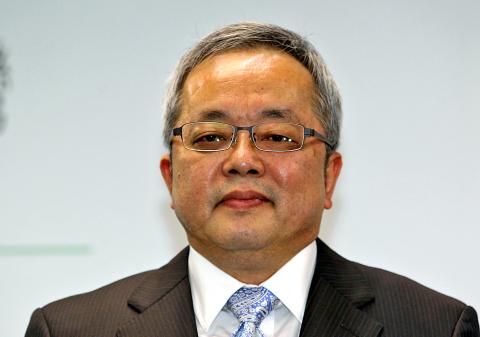Premier Lin Chuan (林全) has appointed Shih Jun-ji (施俊吉) as the new chairman of the Taiwan Stock Exchange (TWSE), Cabinet spokesman Tung Chen-yuan (童振源) said yesterday.
The appointment came amid speculation that Shih, an experienced academic and veteran of Taiwan’s financial regulatory agency, would replace Lee Sush-der (李述德), who is scheduled to retire at the end of this month.
Tung said that Shih, currently a minister without portfolio, has a wealth of experience and a good reputation in both economic theory development and financial market practices, making him a good candidate to take the helm of the TWSE, which operates the local main board.

Photo: CNA
Shih formerly served as chairman of the Financial Supervisory Commission (FSC), the top financial regulator in Taiwan, and was a research fellow at Academia Sinica, the nation’s top research institution.
Shih was born in August 1955 and has a doctorate in economics from National Taiwan University. As a minister without portfolio, he is in charge of policies regarding economics, communication and trade negotiations, including possible talks on entering the US-led Trans-Pacific Partnership.
Citing Lin, Tung said that the TWSE chairman plays an important role in the capital market, as Taiwan is keen to attract funding at home and from overseas to energize its capital market.
Tung said that when Shih served as FSC chairman, he worked closely with the domestic financial market.
As a research fellow at Academia Sinica, Shih has conducted a great deal of research on Taiwan’s financial market, Tung said.
He said Shih has done a good job as a minister without portfolio and his expertise in the financial market makes him ideal for the position of TWSE chairman.
After Shih assumes his new post, he is to step down from his position as minister without portfolio.

SELL-OFF: Investors expect tariff-driven volatility as the local boarse reopens today, while analysts say government support and solid fundamentals would steady sentiment Local investors are bracing for a sharp market downturn today as the nation’s financial markets resume trading following a two-day closure for national holidays before the weekend, with sentiment rattled by US President Donald Trump’s sweeping tariff announcement. Trump’s unveiling of new “reciprocal tariffs” on Wednesday triggered a sell-off in global markets, with the FTSE Taiwan Index Futures — a benchmark for Taiwanese equities traded in Singapore — tumbling 9.2 percent over the past two sessions. Meanwhile, the American depositary receipts (ADRs) of Taiwan Semiconductor Manufacturing Co (TSMC, 台積電), the most heavily weighted stock on the TAIEX, plunged 13.8 percent in

A wave of stop-loss selling and panic selling hit Taiwan's stock market at its opening today, with the weighted index plunging 2,086 points — a drop of more than 9.7 percent — marking the largest intraday point and percentage loss on record. The index bottomed out at 19,212.02, while futures were locked limit-down, with more than 1,000 stocks hitting their daily drop limit. Three heavyweight stocks — Taiwan Semiconductor Manufacturing Co (TSMC, 台積電), Hon Hai Precision Industry Co (Foxconn, 鴻海精密) and MediaTek (聯發科) — hit their limit-down prices as soon as the market opened, falling to NT$848 (US$25.54), NT$138.5 and NT$1,295 respectively. TSMC's

In a small town in Paraguay, a showdown is brewing between traditional producers of yerba mate, a bitter herbal tea popular across South America, and miners of a shinier treasure: gold. A rush for the precious metal is pitting mate growers and indigenous groups against the expanding operations of small-scale miners who, until recently, were their neighbors, not nemeses. “They [the miners] have destroyed everything... The canals, springs, swamps,” said Vidal Britez, president of the Yerba Mate Producers’ Association of the town of Paso Yobai, about 210km east of capital Asuncion. “You can see the pollution from the dead fish.

TARIFFS: The global ‘panic atmosphere remains strong,’ and foreign investors have continued to sell their holdings since the start of the year, the Ministry of Finance said The government yesterday authorized the activation of its NT$500 billion (US$15.15 billion) National Stabilization Fund (NSF) to prop up the local stock market after two days of sharp falls in reaction to US President Donald Trump’s new import tariffs. The Ministry of Finance said in a statement after the market close that the steering committee of the fund had been given the go-ahead to intervene in the market to bolster Taiwanese shares in a time of crisis. The fund has been authorized to use its assets “to carry out market stabilization tasks as appropriate to maintain the stability of Taiwan’s